(6)Unit 3《信息管理与信息系统专业英语》E-C
- 格式:ppt
- 大小:489.00 KB
- 文档页数:25
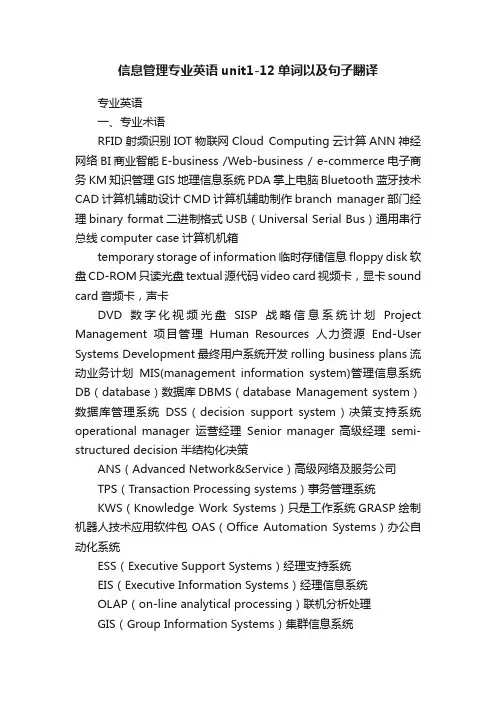
信息管理专业英语unit1-12单词以及句子翻译专业英语一、专业术语RFID射频识别IOT物联网Cloud Computing云计算ANN神经网络BI商业智能E-business /Web-business / e-commerce电子商务KM知识管理GIS地理信息系统PDA掌上电脑Bluetooth蓝牙技术CAD计算机辅助设计CMD计算机辅助制作branch manager部门经理binary format二进制格式USB(Universal Serial Bus)通用串行总线computer case计算机机箱temporary storage of information临时存储信息floppy disk软盘CD-ROM只读光盘textual源代码video card视频卡,显卡sound card音频卡,声卡DVD数字化视频光盘SISP战略信息系统计划Project Management项目管理Human Resources人力资源End-User Systems Development最终用户系统开发rolling business plans流动业务计划MIS(management information system)管理信息系统DB(database)数据库DBMS(database Management system)数据库管理系统DSS(decision support system)决策支持系统operational manager运营经理Senior manager 高级经理semi-structured decision半结构化决策ANS(Advanced Network&Service)高级网络及服务公司TPS(Transaction Processing systems)事务管理系统KWS(Knowledge Work Systems)只是工作系统GRASP绘制机器人技术应用软件包OAS(Office Automation Systems)办公自动化系统ESS(Executive Support Systems)经理支持系统EIS(Executive Information Systems)经理信息系统OLAP(on-line analytical processing)联机分析处理GIS(Group Information Systems)集群信息系统GDSS(Group Decision Support Systems)集群决策支持系统MIT(Management Information technology)管理信息技术RAD(rapid application development)快速应用开发Two-way communications 双工通讯client-server environment 客户服务环境Data warehouse 数据仓库logistics information systems 物流信息系统ERP(Enterprise resource planning)企业资源规划CRM(customer relationship Management)客户关系管理OOD(Object-Oriented design)面向对象设计OOP(Object0Oriented Programming)面向对象编程HLLs(High Level Languages)高级语言ADTs(Abstract Data Types)抽象数据类型Software Ics软件的组成单元machine code机器码op-code输出码EDI(Electronic Data interchange)电子数据交换SMEs(small and medium sized enterprises)中小企业B2B企业对企业电子商务B2C企业对用户电子商务CERT(Character Error Rate Tester)字符出错率测试器CIAS(Communication Link Analyzer System)通信链路分析系统IMS(Information Management System)管理信息系统NDMS(Netware Data Management System)网络数据管理系统二、翻译Unit 11. Management is the attainment of organizational goals in an effective and efficient manner through planning, organizing, leading, and controlling organizational resources.管理是组织目标通过计划、组织、领导、控制组织资源实现的有效方式。
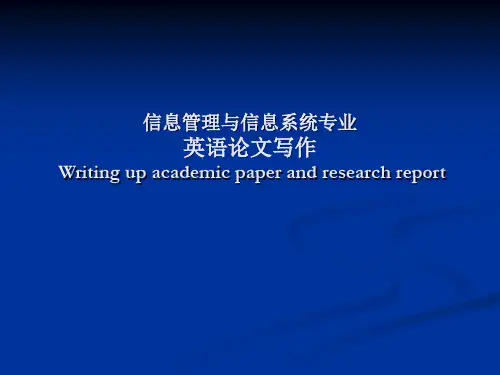
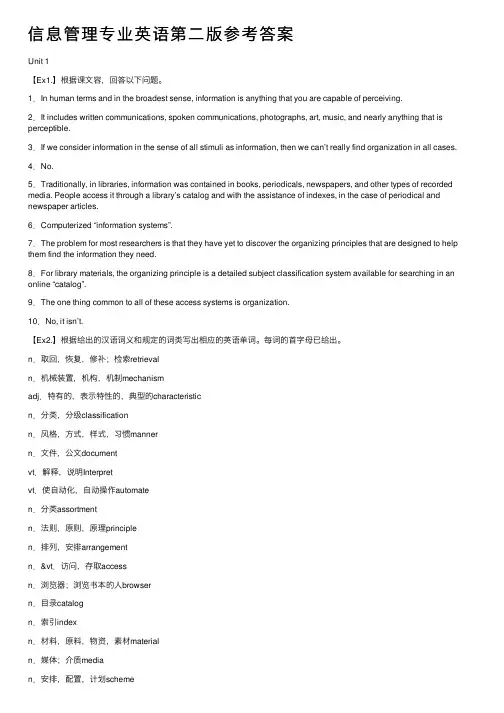
信息管理专业英语第⼆版参考答案Unit 1【Ex1.】根据课⽂容,回答以下问题。
1.In human terms and in the broadest sense, information is anything that you are capable of perceiving.2.It includes written communications, spoken communications, photographs, art, music, and nearly anything that is perceptible.3.If we consider information in the sense of all stimuli as information, then we can’t really find organization in all cases. 4.No.5.Traditionally, in libraries, information was contained in books, periodicals, newspapers, and other types of recorded media. People access it through a library’s catalog and with the assistance of indexes, in the case of periodical and newspaper articles.6.Computerized “information systems”.7.The problem for most researchers is that they have yet to discover the organizing principles that are designed to help them find the information they need.8.For library materials, the organizing principle is a detailed subject classification system available for searching in an online “catalog”.9.The one thing common to all of these access systems is organization.10.No, it isn’t.【Ex2.】根据给出的汉语词义和规定的词类写出相应的英语单词。
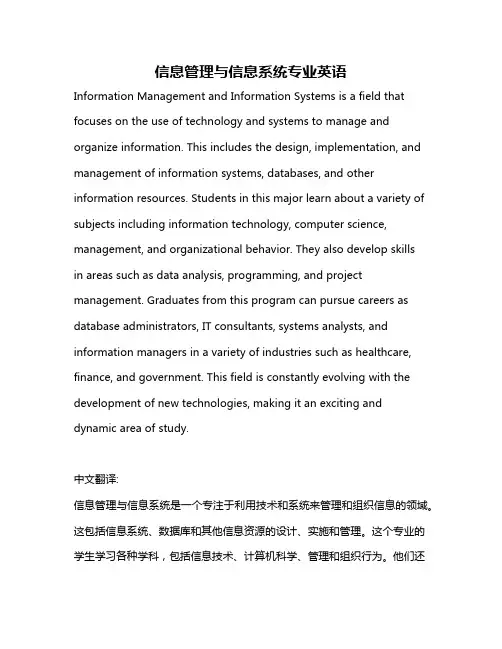
信息管理与信息系统专业英语Information Management and Information Systems is a field that focuses on the use of technology and systems to manage and organize information. This includes the design, implementation, and management of information systems, databases, and other information resources. Students in this major learn about a variety of subjects including information technology, computer science, management, and organizational behavior. They also develop skillsin areas such as data analysis, programming, and project management. Graduates from this program can pursue careers as database administrators, IT consultants, systems analysts, and information managers in a variety of industries such as healthcare, finance, and government. This field is constantly evolving with the development of new technologies, making it an exciting and dynamic area of study.中文翻译:信息管理与信息系统是一个专注于利用技术和系统来管理和组织信息的领域。
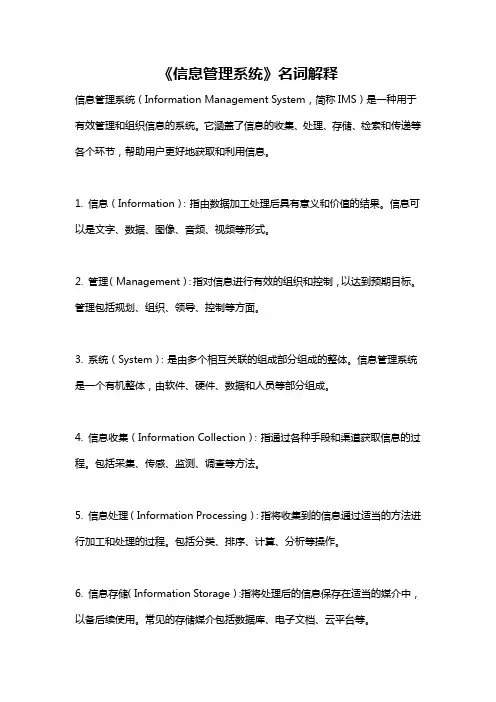
《信息管理系统》名词解释信息管理系统(Information Management System,简称IMS)是一种用于有效管理和组织信息的系统。
它涵盖了信息的收集、处理、存储、检索和传递等各个环节,帮助用户更好地获取和利用信息。
1. 信息(Information):指由数据加工处理后具有意义和价值的结果。
信息可以是文字、数据、图像、音频、视频等形式。
2. 管理(Management):指对信息进行有效的组织和控制,以达到预期目标。
管理包括规划、组织、领导、控制等方面。
3. 系统(System):是由多个相互关联的组成部分组成的整体。
信息管理系统是一个有机整体,由软件、硬件、数据和人员等部分组成。
4. 信息收集(Information Collection):指通过各种手段和渠道获取信息的过程。
包括采集、传感、监测、调查等方法。
5. 信息处理(Information Processing):指将收集到的信息通过适当的方法进行加工和处理的过程。
包括分类、排序、计算、分析等操作。
6. 信息存储(Information Storage):指将处理后的信息保存在适当的媒介中,以备后续使用。
常见的存储媒介包括数据库、电子文档、云平台等。
7. 信息检索(Information Retrieval):指根据需求从存储的信息中获取指定的内容。
可以通过关键词查询、索引检索等方法实现。
8. 信息传递(Information Transmission):指将获取到的信息传递给用户或其他系统的过程。
可以通过网络、邮件、打印等方式完成。
信息管理系统可以应用于各个领域,如企业管理、教育管理、医疗健康、科研等。
它可以提高信息的利用效率和准确性,帮助用户更好地决策和创新。
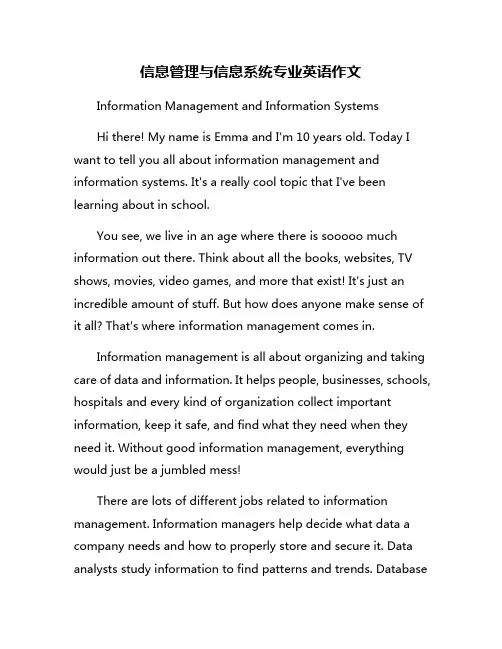
信息管理与信息系统专业英语作文Information Management and Information SystemsHi there! My name is Emma and I'm 10 years old. Today I want to tell you all about information management and information systems. It's a really cool topic that I've been learning about in school.You see, we live in an age where there is sooooo much information out there. Think about all the books, websites, TV shows, movies, video games, and more that exist! It's just an incredible amount of stuff. But how does anyone make sense of it all? That's where information management comes in.Information management is all about organizing and taking care of data and information. It helps people, businesses, schools, hospitals and every kind of organization collect important information, keep it safe, and find what they need when they need it. Without good information management, everything would just be a jumbled mess!There are lots of different jobs related to information management. Information managers help decide what data a company needs and how to properly store and secure it. Data analysts study information to find patterns and trends. Databaseadministrators build systems to hold and organize data. Librarians are amazing information managers for books and resources. Even teachers have to be information managers for all the work you kids turn in!But just collecting data isn't enough on its own. You need systems and technology to truly manage information well. That's where information systems come into play. An information system is a collection of hardware, software, data, people and processes that all work together to manage information.For example, think about the computers and tablets you use for schoolwork. Those are hardware. They run different software programs like word processors, web browsers, games, and educational apps. All the writing, research, assignments and projects you work on is data that gets stored. Your teachers use processes to collect, review and grade that data. And you as the student are also part of that information system!Businesses use massive information systems too. They have servers (big powerful computers) that store huge databases of information about products, employees, sales, shipping, you name it. Different software programs access that data and allow people to analyze it, make decisions, communicate and get work done.Another example of a crucial information system is the ones hospitals use to track patients, medicines, test results and more. Being able to quickly access and manage that information can literally save lives! The human body itself is like an incredibly complex information system with the brain as the central processor.Information systems build on tons of different technologies like computer networks, data storage, cloud computing, cybersecurity and more. A lot of math, science and coding goes into building great information systems. People who work as information systems managers, designers or developers need to really know their stuff.As you can see, information management and information systems are vital for basically every modern organization and keep our world operating efficiently. But they can be used for fun too! Video games are a type of information system requiring huge amounts of code, art, sounds and more. Social media lets us share information in a whole new way. The internet itself is the largest information system humans have ever created.I hope I've helped explain why information management and information systems are so important and cool. One day I might want to be a database administrator, coding the backends forwebsites and apps. Or maybe a data analyst, finding all the hidden insights behind statistics and information. Or who knows, maybe I'll even help design amazing new video games!No matter what though, I know that understanding how to control information flow and make sense of our data-drenched world will be an invaluable skill. We're truly living in the age of information. Awesome information managers and the systems they build will be needed more than ever before. It's anbig responsibility, but also a way to really make a difference. Thanks for learning about this with me!。
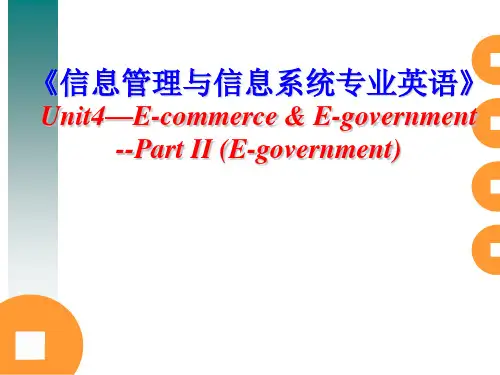
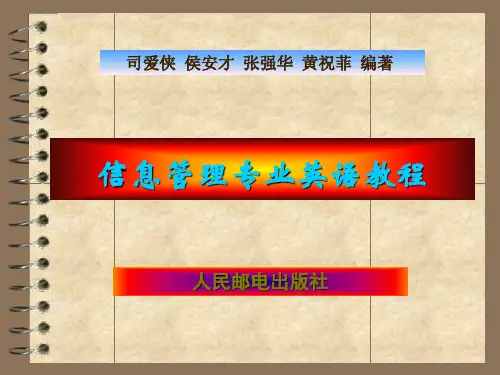
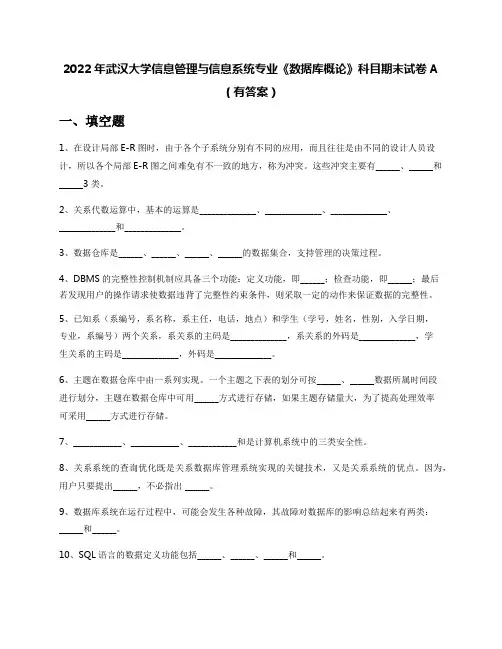
2022年武汉大学信息管理与信息系统专业《数据库概论》科目期末试卷A(有答案)一、填空题1、在设计局部E-R图时,由于各个子系统分别有不同的应用,而且往往是由不同的设计人员设计,所以各个局部E-R图之间难免有不一致的地方,称为冲突。
这些冲突主要有______、______和______3类。
2、关系代数运算中,基本的运算是______________、______________、______________、______________和______________。
3、数据仓库是______、______、______、______的数据集合,支持管理的决策过程。
4、DBMS的完整性控制机制应具备三个功能:定义功能,即______;检查功能,即______;最后若发现用户的操作请求使数据违背了完整性约束条件,则采取一定的动作来保证数据的完整性。
5、已知系(系编号,系名称,系主任,电话,地点)和学生(学号,姓名,性别,入学日期,专业,系编号)两个关系,系关系的主码是______________,系关系的外码是______________,学生关系的主码是______________,外码是______________。
6、主题在数据仓库中由一系列实现。
一个主题之下表的划分可按______、______数据所属时间段进行划分,主题在数据仓库中可用______方式进行存储,如果主题存储量大,为了提高处理效率可采用______方式进行存储。
7、____________、____________、____________和是计算机系统中的三类安全性。
8、关系系统的查询优化既是关系数据库管理系统实现的关键技术,又是关系系统的优点。
因为,用户只要提出______,不必指出 ______。
9、数据库系统在运行过程中,可能会发生各种故障,其故障对数据库的影响总结起来有两类:______和______。
10、SQL语言的数据定义功能包括______、______、______和______。
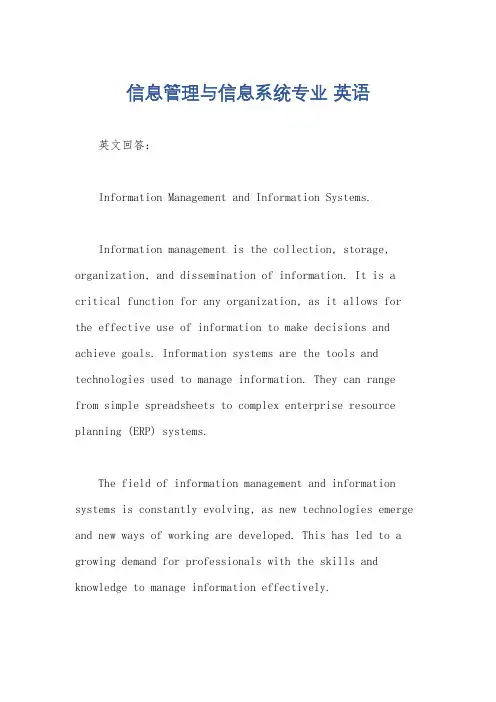
信息管理与信息系统专业英语英文回答:Information Management and Information Systems.Information management is the collection, storage, organization, and dissemination of information. It is a critical function for any organization, as it allows for the effective use of information to make decisions and achieve goals. Information systems are the tools and technologies used to manage information. They can range from simple spreadsheets to complex enterprise resource planning (ERP) systems.The field of information management and information systems is constantly evolving, as new technologies emerge and new ways of working are developed. This has led to a growing demand for professionals with the skills and knowledge to manage information effectively.Skills and Knowledge Required for Information Management and Information Systems Professionals.Professionals in the field of information management and information systems typically need to have the following skills and knowledge:A strong understanding of information management concepts and principles.Proficiency in a variety of information systems software applications.Excellent communication and interpersonal skills.The ability to work independently and as part of a team.A strong work ethic and a commitment to excellence.Career Opportunities for Information Management and Information Systems Professionals.There are a wide range of career opportunitiesavailable for professionals with skills and knowledge in information management and information systems. Some of the most common job titles include:Information manager.Information systems manager.Database administrator.Systems analyst.Business analyst.Project manager.Professionals in these roles can work in a variety of industries, including healthcare, finance, manufacturing, and government.Education and Training for Information Management and Information Systems Professionals.There are a variety of educational and training programs available for professionals who want to work inthe field of information management and information systems. Some of the most common programs include:Bachelor's degree in information management or information systems.Master's degree in information management orinformation systems.MBA with a concentration in information management or information systems.Certificate programs in information management or information systems.Professional Development for Information Management and Information Systems Professionals.In order to stay up-to-date on the latest trends and technologies in the field of information management and information systems, professionals should pursue ongoing professional development. This can be done through a variety of activities, such as:Attending conferences and workshops.Reading industry publications.Taking online courses.Participating in online forums and discussion groups.中文回答:信息管理与信息系统专业。

《信息管理与信息系统专业英语》教 案目录Unit 1 Management Information SystemUnit 2 Information Systems and OrganizationsUnit 3 Database Management SystemsUnit 4 Management Information Systems Development Unit 5 Systems’ Success and FailureUnit 6 Application of Information SystemsUnit 7 Decision Support SystemsUnit 8 Information SecurityUnit 9 Internet EconomyUnit 10 Knowledge ManagementUnit 11 Data MiningUnit 12 Data Warehouse and OLAPUnit 1 Management Information System教学目的及要求1.掌握本单元的专业词汇;2.理解并掌握文中复杂句子所涉及的语法知识;3.流利朗读及翻译课文;4.了解与管理信息系统的基本概念。
主要教学内容授课方式学时分配Text 课堂讲授2学时New WordsPhrases AbbreviationsNotesQuestions for Discussion 课堂讲授课堂讲授课堂讲授课堂讲授课堂讨论1学时Supplementary Reading 引导自学1学时Material for Self-study 学生自学—教学重点与难点[教学重点]:掌握与本文相关的重点词汇,了解管理信息系统的基础知识。
[教学难点]:专业词汇的识别及记忆,连词+过去分词的用法。
教学手段以学生朗读、翻译为主,教师对重点专业词汇及较难懂的句子给以讲述;教师引导学生进行思考题的讨论,锻炼学生的口语表述能力和对专业知识的理解。
2023年自考专业(计算机信息管理)《管理信息系统》考试历年真题摘选附带答案第1卷一.全考点综合测验(共20题)1.【单选题】在管理信息系统开发过程中,信息系统的评价除了包括中期评价、结项评价外,还包括()A.前期评价B.立项评价C.启动评价D.初期评价2.【填空题】DBMS的数据库操纵功能包括对数据的__________、插入、更新和删除。
3.【单选题】关于模块间调用的规则,不正确的说法是()A.下层模块可直接与同级模块进行通信B.下层模块只有接到上层模块调用命令才能执行C.上下级模块之间可直接通信D.模块调用顺序自上而下4.【单选题】战略级管理决策要求信息的()A.详细程度高B.及时程度高C.综合性强D.精确度高5.【填空题】中层数据流程图是对_______数据流程图的分解,分解的原则是以系统的模块( 子系统)为划分标准。
6.【单选题】结构化设计方法使用的图形工具是()A.实体一联系图B.数据流程图C.程序流程图D.模块结构图7.【填空题】一个模块的四个要素分别是输入输出、处理功能、内部数据和________。
8.【单选题】系统实施阶段,软硬件准备的主要依据是()A.系统配置报告和软件配置报告B.系统配置报告和立项报告C.系统物理配置报告和可行性报告中的财力资源约束D.系统软件配置报告和可行性报告中的财力资源约束9.【单选题】关系模型中数据的逻辑结构可以理解为一个二维表,这个二维表中的一行称为()A.关系B.元组C.属性D.主码10.【单选题】在E-R图中,菱形用来表示()A.实体B.属性C.联系D.关系模式11.【填空题】TCP/IP协议的体系结构由低向高包括网络接口层、________层、运输层和应用层四个层次。
12.【单选题】下列选项中,不属于总体性设计的()A.总体结构设计B.数据库设计C.系统物理配置方案设计D.代码设计13.【单选题】在信息系统安全控制活动中,监控系统软件,阻止未经允许对软件、磁盘、磁带等资源的存取或破坏活动,属于()A. 硬件安全控制B.软件及数据安全控制C.管理控制D.计算机操作安全控制14.【填空题】为了有条不紊地传递数据,网络________精确地规定了所交换数据的格式和时序。
Lesson1distributed applications 分布式应用程序competitive advantage 竞争优势data warehouses 数据仓库incompatible databases 不兼容数据库decision support systems 决策支持系统executive information systems 执行信息系统DBMS——database management systems 数据库管理系统entry 款目metadata 元数据mainframe computer大型计算机desktop computer台式计算机laptop computer膝上型计算机spreadsheet 电子表格LAN ------local area network 局域网database server 数据库服务器user views 用户视图data security 数据安全性data integrity 数据完整性concurrent user 并发用户data updating 数据更新data redundancy 数据冗余consistency of data and metadata 数据和元数据的一致性distributed database 分布式数据库telecommunications network 远程通讯网Lesson2automatic indexing自动标引human indexing 人工标引extraction indexing 抽词标引assignment indexing赋词标引controlled vocabulary 受控词表non-substantive words 非实意词index terms 标引词automatic stemming 自动抽取词干weight 权值clue words 提示词inverted file 倒排文档absolute frequency 绝对词频relative frequency 相对词频information retrieval 信息检索syntactic criteria 句法规则word string 词串NLDB——Natural Language DataBase 自然语言数据库MAI——machine-aided indexing 机器辅助标引recall ratio 查全率precision ratio 查准率descriptor 叙词thesaurus 叙词表semantic vocabulary 语义词表concept headings 概念标题consistency of indexing 标引的一致性underassignment 欠量赋词overassignment 过量赋词back file 备份文件main heading 主标题subheading 副标题access point 检索点Lesson3machine-readable form 机读形式source document 源文献subject indexing 主题标引back-of-the-book indexing书后标引indexing scheme 标引方案NFAIS——National Federation of Abstracting and Information Services(美国)国家文摘与信息服务联合会scope notes 范围注释permuted list 轮排词表CAS——Chemical Abstracts Service 化学文摘社character set 字符集statistical correlation 统计关联ISI——Institute for Scientific Information (美国)科学情报社co-citation indexing 共引文标引SCI——Science Citation Indexes 科学引文索引SSCI——Social Science Citation Indexes 社会科学引文标引bibliometric analysis 书目计量分析Lesson4performance enhancement 性能改善scarce resources 稀缺资源proxy servers 代理服务器JAVA executables JAV可执行程序source code 源代码streaming media 流媒体outsourcing 业务外包wild card characters 通配符real-time traffic analysis 实时流量分析static web pages 静态网页ISDN——Integrated Services Digital Network 综合服务数据网URL——Uniform Resource Locator 统一资源定位符HTML——Hypertext Markup Language 超文本标识语言CGI——Common Gateway Interface 公共网关接口XML——Extension Markup Language 扩展标识语言OR——Operation Record 操作记录IIS——Internet Information Services 网络信息服务Lesson5IR——information retrieval 信息检索search engine spam 搜索引擎垃圾soft computing 软计算data mining 数据挖掘information fusion 信息融合classification 分类clustering 聚类thesaurus construction 词表构建Web page categorization 网页分类JPG——Joint Photographic Experts Group 图像文件格式GIF——Graphics Interchange Format 可交换的图像文件格式PNG——Portable Network Graphic 可移植的网络图像文件格式the WWW Consortium 万维网联盟HTTP——Hypertext Transfer Protocol 超文本传输协议TCP——Transfer Control Protocol 传输控制协议ASCII——American Standard Code for Information Interchange 美国信息互换标准代码CPUCentral Processing Unit 中央处理器Lesson6black-box services 黑箱服务delivering information 传递信息videoconferencing 视频会议cross reference互见,相互参照timeliness 及时性cross check 交叉检查,核对knowledge framework 知识结构Lesson7IP——intellectual property 知识产权electronic holdings of libraries 电子馆藏information infrastructure 信息基础设施copyright 版权patent 专利exclusive right 专有权subsequent editions 后续版本Lesson8encryption technologies 加密技术decrypted digital version 解密数字版本fair use doctrine 公平利用原则authenticity and integrity of the information 信息的可靠性和完整性DMCA——the Digital Millennium Copyright Act 数字千年版权法DVD——digital video diskencyclopedias 百科全书Lesson9CKO——chief knowledge officer 知识主管knowledge sharing 知识共享manual 手册competitive intelligence 竞争情报search engine 搜索引擎artificial intelligence 人工智能drill-down access 深度查询accessibility 可获得性knowledge discovery 知识发现quantitative data 定量数据qualitative data 定性数据virtual warehouses 虚拟(数据)仓库virtual library 虚拟图书馆relational database 关系数据库research and development 研发(研究与开发)directory 指南newsletter 简讯intelligent search agents 智能检索代理information resources 信息资源performance evaluation 性能评价Lesson10CIO——chief information officer信息主管ERP——Enterprise Resource Planning 企业资源规划CRM——Customer Relationship Management 客户关系管理Collaborative Applications Environment 协同应用环境workflow package 工作流软件包Lesson11rights of information users 信息用户的权利obligations of information users 信息用户的义务terms and conditions 条款。
1. informationInformation, in its most restricted technical sense, is a sequence of symbols that can be interpreted as a message. Information can be recorded as signs, or transmitted as signals. Information is any kind of event that affects the state of a dynamic system. Conceptually, information is the message (utterance or expression) being conveyed. This concept has numerous other meanings in different contexts.[1] Moreover, the concept of information is closely related to notions of constraint, communication, control, data, form, instruction, knowledge, meaning, mental stimulus, pattern, perception, representation, and especially entropy.(信息,在其最受限制的技术意义上,是一个序列的符号,可以被解释为一个消息。
信息可以被记录为标志,或传输信号。
信息是任何类型的事件,影响一个动态系统的状态。
从概念上讲,信息是信息(话语或表达式)的表达。
这一概念具有许多其他在不同语境下的含义。
[1]此外,信息的概念密切相关的概念约束、通信、控制、数据、形式、指令、知识、意义,精神刺激,模式,感知的代表性,尤其是熵。
2022年河北工程大学信息管理与信息系统专业《计算机网络基础》科目期末试卷B(有答案)一、选择题1、以下说法错误的是()。
I..广播式网络一般只包含3层,即物理层、数据链路层和网络层II.Intermet的核心协议是TCP/IPIII.在lnternet中,网络层的服务访问点是端口号A. I、II、IIIB. IIIC. I、ⅢD. I、II2、计算机网络拓扑结构主要取决于它的()。
A.资源子网B.路由器C.通信子网D.交换机3、下列关于传输层协议中面向连接的描述,()是错误的。
A.面向连接的服务需要经历3个阶段:连接建立、数据传输以及连接释放B.面向连接的服务可以保证数据到达的顺序是正确的C.面向连接的服务有很高的效率和时间性能D.面向连接的服务提供了一个可靠的数据流4、oS17层模型中,提供端到端的透明数据传输服务、差错控制和流量控制的层是()。
A.物理层B.网络层C.传输层D.会话层5、在使用以太网交换机的局域网中,以下表述哪个是正确的()。
A.局域网只包含一个冲突域B.交换机的多个端口可以并行传输C.交换机可以隔离广播域D.交换机根据LLC目的地址转发6、信道速率为4kbit/s,采用停止-等待协议。
传播时延t=20ms,确认帧长度和处理时间均可忽略。
问帧长()才能使信道的利用率达到至少50%。
A.40bitB.80bitC.160bitD.320bit7、下列关于单模光纤的描述中,正确的是()A.单模光纤的成本比多模光纤的成本低B.单模光纤传输距离比多模光纤短C.光在单模光纤中通过内部反射来传播D.单模光纤的直径一般比多模光纤小8、下列哪些是虚电路的特点?()I.传输前建立逻辑连接II.分组按序到达III.分组开销小IV.分组单独选择路由A.仅I、II、IIIB.仅II、IIIC.仅I、III,IVD.仅I、II,IV9、X台计算机连接到一台YMbit/s的集线器上,则每台计算机分得的平均带宽为()。